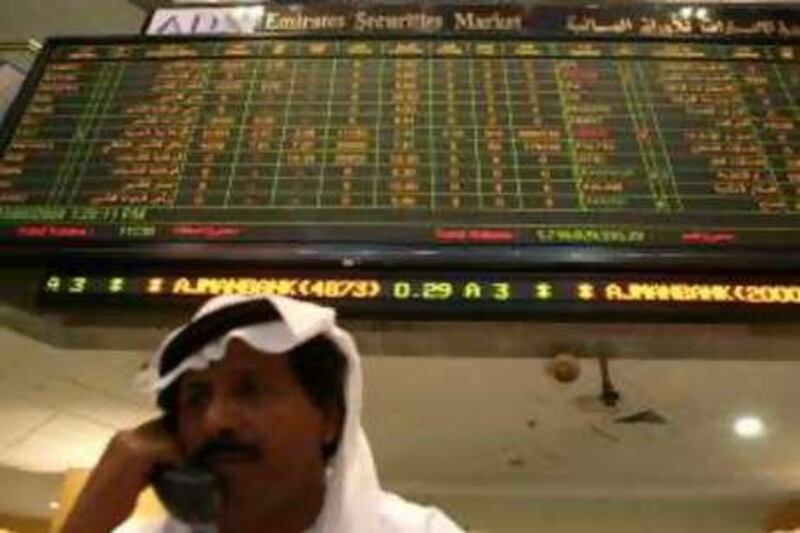Local stock markets fell today, hit by weak earnings reports and fears that the Government's most recent round of cash injections may not be enough to ease the credit crunch. Among the biggest losers were financial and real estate stocks, including Emirates NBD who announced earnings yesterday that showed net profit down from the preceding quarter. The Dubai Financial Market fell by 4.24 per cent to 3,209 points, while the Abu Dhabi Securities Exchange ended down 1.58 per cent, at 3,595 points. Other regional markets followed suit, with the Saudi Tadawul and the Kuwait Stock Exchange falling 3.69 per cent and 2.15 per cent respectively.
Weak performances in Asia pulled down the Gulf markets, a chain effect that has become increasingly prevalent in a jittery global market, analysts say. "If the Dow Jones goes down tonight, we can expect it to follow through here tomorrow," said Vyas Jayabhanu, the head of the broker Al Dhafra in Abu Dhabi. Japan's Nikkei average slid 6.8 per cent yesterday on worries about weak earnings reports from banks.
On Tuesday, the Government announced that it would inject Dh25 billion (US$6.8bn) into local banks to combat an increasingly serious credit shortage. However, Ali Khan, a director at Arqaam Capital, was sceptical about the effectiveness of the move. "If you look at the interbank rates, they haven't really responded to anything," he said. Until banks revealed that they had received the government cash, investors would not be likely to see the injection as a reason to buy, he said.
The three-month Emirates interbank offered rate (Eibor), which indicates the seriousness of the local credit shortage, has hovered above 4.5 per cent for the past two weeks, even as other regional rates have fallen. Although Eibor dropped slightly yesterday from 4.68 to 4.64, it still remains more than double where it stood in June, and well above both the Kuwait and the London interbank rates, which have fallen by more than a percentage point in recent weeks.
"Eibor has been quite sticky," said one banker. The Emirates had attracted significant cash inflows during the past year, he said, which had made the rapid withdrawal of international funds experienced in recent months "particularly harsh". Weaker than expected quarterly reports from local banks this week gave some investors reason to worry about the outlook for the sector. Shares of Emirates NBD, the largest bank, fell five per cent to Dh6.59 yesterday.
On Tuesday, the Abu Dhabi Commercial Bank (ADCB) announced that its third quarter net income fell 26 per cent after it wrote down some of its investments. The National Bank of Abu Dhabi, the region's second-biggest bank, also revealed a third quarter profit that failed to meet analysts' expectations. Among the other local losers yesterday was Emaar Properties, which saw its stock fall 5.3 per cent to Dh5.74.
Mr Jayabhanu found the ADCB results particularly disheartening. "With banking fears looming globally, it's not a very good sign." In the US, Wachovia announced it was taking a $23.9bn loss in the third quarter, the largest of any US lender since the credit crisis began, according to Reuters. Wells Fargo & Co is scheduled to acquire Wachovia in one of the many bank mergers caused by recent market chaos in the US.
tpantin@thenational.ae






